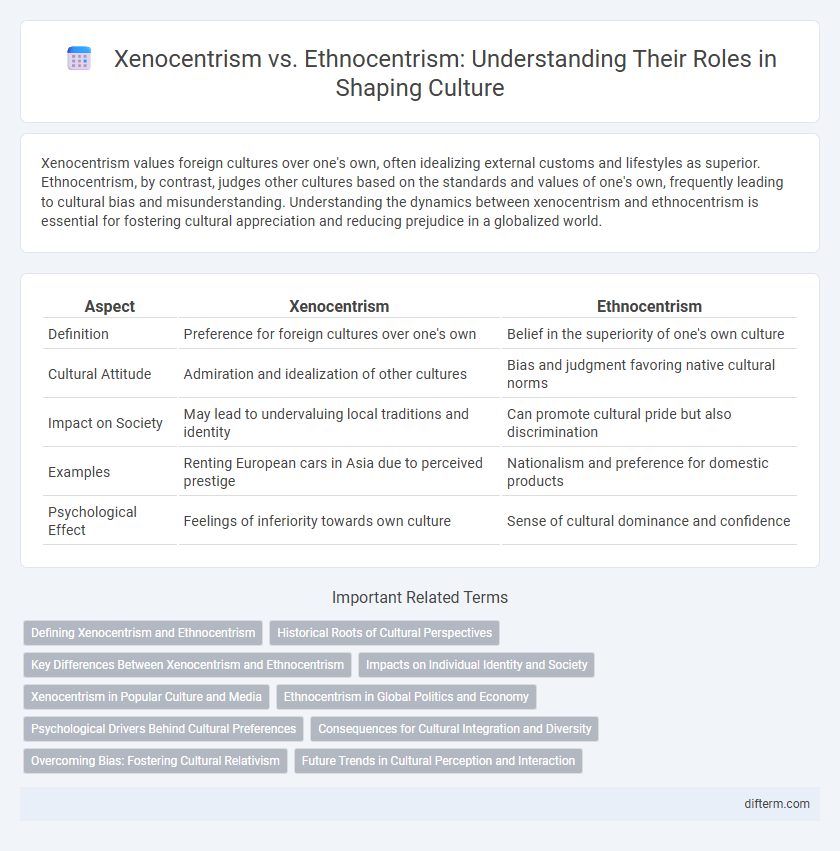Xenocentrism values foreign cultures over one's own, often idealizing external customs and lifestyles as superior. Ethnocentrism, by contrast, judges other cultures based on the standards and values of one's own, frequently leading to cultural bias and misunderstanding. Understanding the dynamics between xenocentrism and ethnocentrism is essential for fostering cultural appreciation and reducing prejudice in a globalized world.
Table of Comparison
| Aspect | Xenocentrism | Ethnocentrism |
|---|---|---|
| Definition | Preference for foreign cultures over one's own | Belief in the superiority of one's own culture |
| Cultural Attitude | Admiration and idealization of other cultures | Bias and judgment favoring native cultural norms |
| Impact on Society | May lead to undervaluing local traditions and identity | Can promote cultural pride but also discrimination |
| Examples | Renting European cars in Asia due to perceived prestige | Nationalism and preference for domestic products |
| Psychological Effect | Feelings of inferiority towards own culture | Sense of cultural dominance and confidence |
Defining Xenocentrism and Ethnocentrism
Xenocentrism is the cultural preference for products, ideas, or lifestyles from other societies, often deeming them superior to one's own. Ethnocentrism involves evaluating other cultures based on the standards and values of one's own culture, typically leading to a sense of cultural superiority. Both concepts influence intercultural perceptions and social behavior, highlighting contrasting attitudes toward cultural identity and diversity.
Historical Roots of Cultural Perspectives
Xenocentrism and ethnocentrism have deep historical roots reflecting societies' responses to cultural encounters and power dynamics. Ethnocentrism emerged from ancient civilizations prioritizing in-group norms as a means of social cohesion and identity preservation. In contrast, xenocentrism evolved through trade, colonization, and globalization, where admiration for foreign cultures often indicated shifts in social status and cultural value.
Key Differences Between Xenocentrism and Ethnocentrism
Xenocentrism favors foreign cultures over one's own, often perceiving external customs and values as superior, while ethnocentrism centers on the belief that one's own culture is the highest standard and judges others accordingly. Xenocentrism can lead to the adoption of foreign lifestyles and consumer preferences, contrasting with ethnocentrism's tendency to promote cultural preservation and national pride. These key differences shape social attitudes, influencing intercultural interactions and identity formation within diverse societies.
Impacts on Individual Identity and Society
Xenocentrism, which values foreign cultures over one's own, can lead to diminished pride and confusion in individual identity, contrasting with ethnocentrism's emphasis on in-group superiority that fosters strong cultural cohesion but may breed intolerance. Both perspectives significantly shape societal dynamics: xenocentrism promotes openness and cultural exchange while risking cultural disintegration, whereas ethnocentrism reinforces social unity, often at the expense of diversity and global cooperation. Balancing these cultural attitudes is essential for nurturing inclusive identities and harmonious societies in an increasingly interconnected world.
Xenocentrism in Popular Culture and Media
Xenocentrism in popular culture and media manifests through the idealization of foreign lifestyles, fashion, and entertainment, often portraying them as superior to local traditions. This phenomenon drives consumer behavior, influencing trends and shaping identity by valuing global cultural products over indigenous ones. Media platforms amplify this effect by continuously promoting international cultures, which can lead to a diminished sense of national cultural pride.
Ethnocentrism in Global Politics and Economy
Ethnocentrism in global politics and economy often leads to biased policy-making that favors one's own cultural or national group, resulting in protectionism and trade barriers. This cultural bias influences diplomatic relations and international negotiations, potentially escalating conflicts due to misunderstandings or prejudices rooted in national identity. Such dynamics hinder global cooperation, affecting economic integration and the equitable distribution of resources across different nations.
Psychological Drivers Behind Cultural Preferences
Psychological drivers behind cultural preferences reveal that xenocentrism stems from admiration or idealization of foreign cultures, often driven by perceptions of status, novelty, or superiority associated with external cultural traits. In contrast, ethnocentrism arises from an inherent bias favoring one's own culture, fueled by a need for identity, belonging, and validation within familiar social groups. Cognitive mechanisms such as in-group favoritism, social identity theory, and stereotyping significantly influence these cultural orientations, shaping global interactions and personal worldview.
Consequences for Cultural Integration and Diversity
Xenocentrism often leads to the idealization of foreign cultures, which can cause the undervaluation of local traditions and hinder authentic cultural integration. Ethnocentrism promotes in-group favoritism, resulting in social exclusion and resistance to cultural diversity. Both mindsets disrupt harmonious multicultural coexistence by fostering cultural misunderstandings and limiting open intercultural dialogue.
Overcoming Bias: Fostering Cultural Relativism
Overcoming bias requires shifting from ethnocentrism, the tendency to view one's own culture as superior, to xenocentrism, which often idolizes foreign cultures while devaluing the native. Embracing cultural relativism promotes understanding by evaluating cultural practices within their own contexts rather than through a hierarchical lens. This approach fosters empathy and reduces prejudice, encouraging coexistence and mutual respect among diverse cultural groups.
Future Trends in Cultural Perception and Interaction
Future cultural perception trends indicate a shift from ethnocentrism, which prioritizes one's own culture as superior, to xenocentrism, where foreign cultures are increasingly valued and idealized. Advances in digital communication and global mobility foster more cross-cultural interactions, promoting appreciation and adoption of diverse cultural practices. This evolving dynamic may enhance global cooperation and hybrid cultural identities in the coming decades.
xenocentrism vs ethnocentrism Infographic

 difterm.com
difterm.com